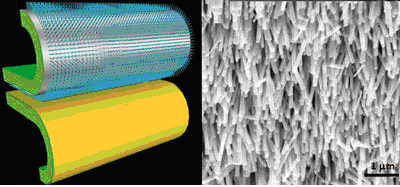Research teams from the US and Korea have developed a nanomaterial-based sensor, which can detect the presence of mercury ions in water.
 Left: zinc oxide nanowires on a flexible substrate (top) with a gold film electrode (bottom); right: zinc oxide nanowires
Left: zinc oxide nanowires on a flexible substrate (top) with a gold film electrode (bottom); right: zinc oxide nanowires
Zhong Lin Wang and his co-workers from Atlanta-based Georgia Institute of Technology have developed a nanogenerator with the help of zinc oxide nanowires to acquire energy. Since these eco-friendly ZnO nanowires are piezoelectric, they gather charge on being moved. With the help of this device, they made a sensor, which derives energy from movements happening in its surroundings.
To create the nanogenerator, the researchers placed the nanowires on a flexible substrate. The edges of the wires were kept in contact with a gold film electrode. During movement, as the nanowires get compressed, electrons traveled along the wires towards the gold conductor. During these compression and release cycles, the electrons run back and forth, thus creating an electrical current. The sensor is powered by a capacitor that gathers the output and this helps the sensor detect pollutants at regular intervals.
The sensor contains single-walled carbon nanotubes, which switch on an LED indicator. On testing this nanogenerator in water, Wang found that the LED glowed in the presence of mercury, and the LED light intensity was a measure of the concentration of mercury ions.
Wang said that these sustainable devices can find applications in wireless biosensing, personal electronics, sensor networks, and national security. The research group is also working on harvesting environmental energy using other methods such as air flow or water turbulence and sonic waves, he added.
Source: http://www.gatech.edu